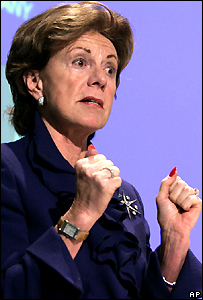The Stop Online Piracy Act (SOPA), a controversial bill before the House of Representatives aimed at combating “rogue websites,” isn’t just about criminal, foreign-based sites that break U.S. intellectual property laws with impunity. Few dispute that these criminal websites that profit from large-scale counterfeiting and copyright infringement are a public policy problem. SOPA’s provisions, however, extend beyond these criminal sites, and would potentially subject otherwise law-abiding Internet intermediaries to serious legal risks.
Before moving forward with rogue websites legislation, it’s crucial that lawmakers take a deep breath and appreciate the challenges at stake in legislating online intermediary liability, lest we endanger the Nozickian “utopia of utopias” that is today’s Internet. The unintended consequences of overbroad, carelessly drafted legislation in this space could be severe, particularly given the Internet’s incredible importance to the global economy, as my colleagues have explained on these pages (1, 2, 3, 4, 5, 6)
To understand why SOPA could be a game-changer for online service providers, it’s important to understand the simmering disagreement surrounding the Digital Millennium Copyright Act (DMCA) of 1998, which grants certain online service providers a safe harbor from liability for their users’ copyright infringing actions. In exchange for these protections, service providers must comply with the DMCA’s notice-and-takedown system, adopt a policy to terminate users who repeatedly infringe, and meet several other conditions. Service providers are only eligible for this safe harbor if they act to expeditiously remove infringing materials upon learning of them. Also ineligible for the safe harbor are online service providers who turn a blind eye to “red flags” of obvious infringement.
The DMCA does not, however, require providers to monitor their platforms for infringing content or design their services to facilitate monitoring. Courts have held that a DMCA-compliant service provider does not lose its safe harbor protection if it fails to act upon generalized knowledge that its service is used for many infringing activities, in addition to lawful ones, so long as the service provider does not induce or encourage users’ infringing activities.
Defenders of the DMCA safe harbor argue that it’s helped enable America’s Internet-based economy to flourish, allowing an array of web businesses built around lawful user-generated content — including YouTube, Facebook, and Twitter — to thrive without fear of copyright liability or burdensome monitoring mandates.
Conversely, some commentators, including UCLA’s Doug Lichtman, argue that the DMCA inefficiently tips the scales in favor of service providers, to the detriment of content creators — and, ultimately, consumer welfare. Pointing to a series of court rulings interpreting the safe harbor’s provisions, critics argue that the DMCA gives online intermediaries little incentive to do anything beyond the bare minimum to stop copyright infringement. Critics further allege that the safe harbor has been construed so broadly that it shields service providers that are deliberately indifferent to their users’ infringing activities, however rampant they may be.
What does SOPA have to do with all of this? Buried in the bill’s 78 pages are several provisions that run a very real risk of effectively sidestepping many of the protections conferred on online service providers by the DMCA safe harbor.
Continue reading →


 The Technology Liberation Front is the tech policy blog dedicated to keeping politicians' hands off the 'net and everything else related to technology.
The Technology Liberation Front is the tech policy blog dedicated to keeping politicians' hands off the 'net and everything else related to technology.